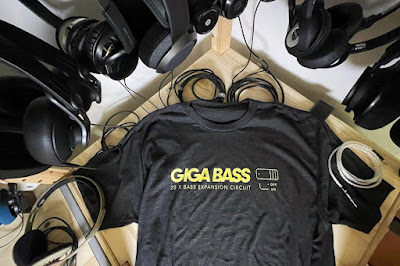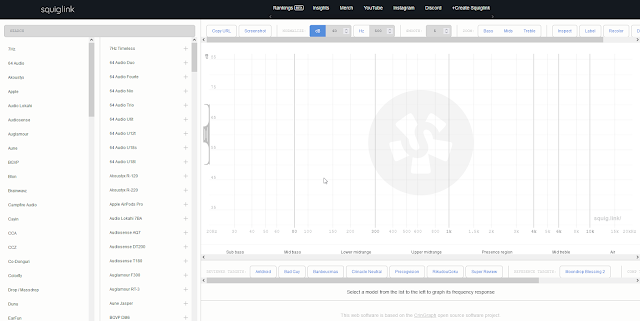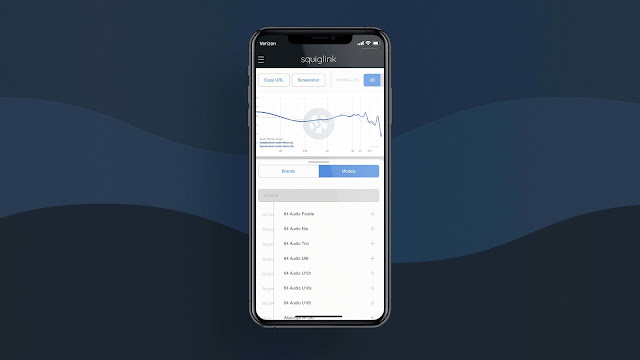- Get link
- X
- Other Apps
English | Español
I am happy to be able to add another interview to the series, where we get to know the reviewers a little better, and the latest person to be kind enough to participate is Mark Ryan, also known as MRS, the person behind the YouTube channel Super* Review, amongst many other things.
You can find his channel here: Super* Review
So, without any further rambling from myself, on with the interview...
When did you start to take interest in hifi audio and what was it that triggered your interest?
It was a slow burn for me. Back in 2004 when I first started working in San Francisco, I had a few coworkers who were into headphones and said things like, "Oh you gotta get Sennheisers," which was a brand name I'd never heard of before. It felt like some insider secret. Later, another coworker brought in this steampunk, homemade-looking headphone and put it on my head and it was better sound than I'd ever heard before. They were a pair of Grados, the first open-back can I'd ever tried. A couple years later, I bought my own.
When did you decide to start reviewing and what was it that made you start?
I started Super* Review in 2017. The impetus is actually related to the previous answer -- I had those Grado SR80s for years as my only headphone, and I'm generally pretty frugal so I'd never considered owning more than one headphone. But by 2017, Bluetooth headphones had gained a lot of steam, and my curiosity to explore more headphones was growing hard to resist. To justify owning more than one pair of headphones, I decided… I'll do some superficial reviews on YouTube.
Have your reviews always been on YouTube or have you published written reviews?
In the realm of audio, I've only ever reviewed on YouTube. But I'm old. I grew up online in the '90s. I've always been into hobbyist publishing, and in high school I published written video game reviews on a GeoCities website.
Your reviews are actually in a livestream format, what made you decide to take this approach?
It wasn't always like that. I initially started with standard pre-recorded + edited videos (VODs), and did that for a couple of years. But I really dislike Adobe Premiere and found myself procrastinating on publishing content I'd already recorded because I didn't want to edit. Live streaming with multiple cameras and a Stream Deck to switch the view in real time lets me record, edit, and publish simultaneously, which really removed a lot of the friction contributing to my procrastination. In short, it lets me publish more often.
Do you think doing livestream reviews makes it more complicated?
Live streaming puts different demands on setup and prep, but overall, no, I think it's a simpler, more scalable process. Things I no longer have to fiddle with include: (1) Syncing audio from an external recorded to the video footage; (2) syncing A-roll and overhead cam footage on a timeline; (3) Shooting and implementing B-roll; (4) Exporting and uploading; (5) Trying to be perfect. That last one is big -- and something most viewers probably don't consider. Behind every 10-minute-long YouTube video (not just mine) is 30-60 minutes of throwaway recording, with the presenter making mistakes, forgetting what they were gonna say, re-phrasing, cursing themselves, etc. With VOD, you're allowed to show only your best takes, which creates an expectation for perfection. Doing videos live forces me to accept mistakes and just push on, which I think is both healthier for myself mentally, but also reduces complexity.
What is your procedure with the product before you actually do the review?
If it's an earphone, I typically measure the frequency response to publish on Squiglink, but otherwise I try to just live with a product and use it as I normally would. Spend lots of time listening, wear it to bed, wear it while working, take notes, and start building conclusions. I have a handful of tracks and albums I like to listen to with everything, but I have let go of some music if I get tired of it and I'll move onto new interests. If anyone imagines my review process is in pursuit of some controlled, objective conclusion, I hate to disappoint, but for me it's really just about finding out if I enjoy something, and that means using products casually, with whatever music I happen to be jiving with at the time.
At what point in your process do you measure the product? Before or after listening to it?
Almost always before, as a matter of trying to get information public as soon as possible.
If before: Do you think it conditions your opinion?
I am sympathetic to the concern that looking at graphs can bias opinions before hearing something, and I don't doubt that they influence my interpretation of sounds. I try to use graphs more as diagnostic tools than for making value judgments. I really am still often surprised by how things sound versus how they graph. For example, I would not expect Tin Hifi's P1 to sound the way it does, based on its graph. So while, again, I share some concern that graphs can be biasing, I don't find they have much influence on how much I actually enjoy things.
As I suggested, I really think of graphs as diagnostics tools. If I get to hear something before I see the frequency response, it's always interesting to look at the graph later and say, "Ah, that might explain why I heard [this and that]," but I don't find graphs influence my enjoyment of earphones. There are some good-looking squigs for earphones I just don't care for, which either shows (a) I don't know how to read graphs as well as I sometimes think I do, (b) maybe frequency response doesn't measure everything, or (c) probably a combination of both.
Speaking of measurements, you are the person behind squiglink, can you explain what it is?
Squiglink is a site I launched initially to host my own database of earphone frequency responses. It uses the same open source software that Crinacle uses, called CrinGraph. Initially I had set up the software locally on my hard drive, not to publish publicly. Then I decided to measure every IEM I have, and after that I had a sizable database and figured… I should put this online for anyone who's interested. Then I decided I wanted to add some functionality to the site, so I ended up making quite a few changes and contributing to the CrinGraph open source project. And then I started helping other IEM reviewers host their own databases as subdomains on the site. Since launching earlier this year, Squiglink has had 20,000 visitors, which is definitely more than I ever imagined it'd get to.
Do you have any specifications that the people (reviewers) who use squiglink need to fulfill or they each independently responsible for the standard of their measurements?
Nah, I've been conceptualizing it as a platform like Twitter or YouTube -- anyone can start their own database and graph to whatever standards they see fit. Whether or not anyone takes the data seriously is not up to me. I think there are a lot of misconceptions about graph data, and what you can know from it, how comparable graphs are between reviewers, etc. But I don't think me acting as a gatekeeper improves that. The more people sharing information, experimenting, and learning, the better quality understanding we'll have.
What is your aim for squiglink moving forwards?
I have a design overhaul brewing in Figma, but I am a bit worried it will require me forking the CrinGraph project so I've been procrastinating on that. I'd also like to do some very unsexy work on the backend, making it easier for graphers to update their databases. The process is pretty clunky at the moment, involves editing JSON files and uploading measurements via FTP. To be honest, that work is probably beyond my capabilities, but I'd like to try and improve it.
What is your most memorable review which is not necessarily the thing you liked the most?
Hm, maybe the Fiio FH5s, which I reviewed earlier this year. The earphone itself is… fine, it has some problems. But I had noticed that every time I was unfavorable to a Fiio IEM, fans of the company would make excuses like "you didn't burn it in long enough," or "you have to use a copper cable to tame the treble." And while I started the hobby assuming these sorts of things must have some merit, I've done a lot of testing for myself to determine that I just don't buy it, I don't hear differences after "burning in" earphones for hundreds of hours and I don't hear differences using cables with different metal makeup. But I'm also open to being wrong, so I used the FH5s review as an opportunity to test these things. I burned them in for 200 hours -- that's over a week, running 24 hours a day. And then I did a live stream where I surprised myself by actually measuring a difference.
The difference was tiny and didn't impact my perception of the sound, certainly not with 200 hours between listening sessions. But it was fun to throw a bone to the burn-in believers while at the same time confirming for myself that… burn in really doesn't matter.
Is there anything you would love to review but haven't been able to?
JVC's FW10000 is an earphone I really want to try out, based on the frequency response I've seen. But as I said before, I've been let down by a promising FR before.
Is there anything you have reviewed but would change the review, or review it differently, if you could?
Ha, a lot. When I started the channel, I was not experienced at all. I bought the Tin Hifi T2 on the recommendation of Reddit posters and reviewed it, my first IEM ever. Now with the experience of having heard literally hundreds of pairs of IEMs, yes, I would change a lot of my earlier conclusions. In fact, on my Squiglink rankings board I have new scores for earphones I reviewed years ago, and almost universally my new scores are lower than they were in my videos. Part of it is learning experience, and part of it is just the ever-evolving expectations as companies seem to continually one-up themselves.
How did you come up with your preference target?
It's basically my review of the Moondrop Blessing 2. I said the Blessing 2 is just about perfect, with a bit of harshness in the mid treble and it could be improved with a stronger sense of air. My preference target is just Blessing 2 with those changes.
What do you feel is the most important aspect to you, such as frequency response, detail, etc.?
Separation and clarity do it for me. Call it soundstage, imaging, whatever -- I just want a strong sense of 3D space, with clearly-separated instruments, and a vocal tonality that doesn't sound funky. That may sound prescriptive, but I think that description really does get represented in a lot of very different frequency responses, so despite having a target curve, I'm really not that picky about an exact frequency response.
Do you have a preference for one kind of driver over another? If so, why?
Not really. Whatever issues some people have with "coherency" I don't really share, so I'm generally a fan of hybrids that allow earphone makers to hit specific tuning goals -- which multi-BA and EST sets seem to do better than dynamics -- while maintaining the physicality to the bass that only a dynamic driver can deliver.
What are your favourite IEMs and headphones at the moment?
Moondrop Blessing 2 is so good. Over the summer, I spent so much time reviewing other earphones that I honestly kind of forgot how good the Blessing is, but I've been slowing my review pace intentionally the past couple months and spending more time with some old favorites. And the Blessing 2 really is just a standout sound for me. I really think I would take it over any other IEM I've heard, including the $2,000+ stuff.
What would you like to improve on them?
...Tame the mid-treble harshness and add some air :P
Do you normally read or watch other reviews?
I do! I enjoy the general discourse of the hobby, and that means absorbing different opinions on new things all the time. If I am reviewing a particular product, I do avoid reading or watching other reviews of that same product until after I've finished my own. It can be impossible to avoid knowing that a product is getting hyped, and that X reviewer really loves Y product, but I'm not too worried about that influence. Mostly I want to make sure that whatever I say, I say in my own words, and it can be too easy to have language and ideas incepted if I'm consuming reviews before I've finished my own.
What reviewers do you feel align with your own tastes?
Align with my tastes? Honestly, none really. There are a lot of reviewers I respect, and if they're excited by something I'll probably be very excited to try it for myself. But I think my general preference is for less bass than most reviewers like. Maybe Oluv has the closest target preference to mine, but his range of acceptable is much narrower than mine.
What is your opinion on the "objective vs subjective" debate?
There's more than one way to enjoy the hobby, I don't have strong feelings about what other people do for themselves. Personally, I am first and foremost interested in my subjective interpretations of my own experiences. I am not seeking some objective, measurable ideal outside of my personal perception. On the other hand, I do like to use measurements to diagnose my perceptions and develop a more predictive understanding of the mechanics of audio, and I'm also acutely aware of how easy it is to fool ourselves with audio placebos. So while I am not chasing measurement perfection, I'm also not interested in perpetuating opinions that won't withstand a blind A-B test.
What is the thing that you most dislike about the hobby?
It's too hard for people to experience audio products for themselves. Reviews and squig sites exist to address this problem, but even as someone with a hand in both, I think they're pretty inadequate for accurately setting expectations for hobbyists who have to spend money before hearing products for themselves.
Where do you think the audio world will be in 5 years from now?
Not sure, probably not too different from where we're at now. I am old enough that five years doesn't seem very long into the future. Maybe look at the digital camera market as a preview of what's to come for audio. Digital cameras got squeezed by smartphone trends a few years before wired headphones did, and that lead to the decimation of the low-cost camera market. Digital cameras continue to develop and get better all the time, but they seem to also be getting more expensive. I don't expect the entry level of audio to evaporate, but do expect the average cost of keeping up with the hobby to continue pushing upward, and not just as a matter of currency inflation.
Anything you would like to add or mention?
Be good to each other.
I would like to thank MRS for taking the time to answer all these questions and give us a better view on how he interprets the audio world and how he addresses his reviews. Make sure to check out his channel if you haven't done so already.
I hope you enjoyed reading this interview and I hope to be back soon with another interview, until then, keep enjoying the music!
To comment or contact, visit any of the following social media platforms:
- Get link
- X
- Other Apps











